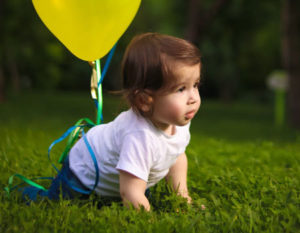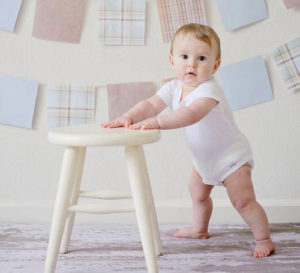Babies are born with irresistibly cute feet – tiny, straight toes, soft and pink skin. A newborn’s feet are soft and pliable because they are mostly made of fatty tissue (muscles, ligaments and tendons) which develop into bones later. Although the baby doesn’t walk until around 15 months of age, this skill is already programmed into the baby’s body. If you hold the baby under his arms and ‘stand’ him gently on a surface, he will move his legs as though he is walking. This “stepping reflex” is present at birth and disappears within 6 weeks.
Your baby’s new feet may be blue, wrinkled and peeling like most part of his body after 9 months in a cocoon of protective fluid. Not to worry – the feet will pinken up and fill out as soon as the baby gets warm.
Babies generally have flat feet because they are born with a pad of fat even in the arch area. Also their leg and foot muscles aren’t developed enough to support their arches when they first begin to stand. Infact the arch doesn’t become apparent until the age of 7.
Developmental Stages of a Baby’s Feet:
There are three main stages of development of a baby’s feet. They include :
1. Pre- walkers and Crawlers:
 Children who haven’t shown interest in walking or standing yet, fall into this category. By 6 to 10 months of age, the baby’s feet start taking shape and many important developments happen during this stage. You can expect the baby’s feet to grow by three sizes and then measure half of the length of their eventual adult foot by their first birthday only! Newborns have super delicate feet and have zero bones in their feet and are only made of spongy cartilage – which later ossifies into the 26 bones and 33 joints that eventually comprise an adult foot. This process isn’t complete until 18 years of age.
Children who haven’t shown interest in walking or standing yet, fall into this category. By 6 to 10 months of age, the baby’s feet start taking shape and many important developments happen during this stage. You can expect the baby’s feet to grow by three sizes and then measure half of the length of their eventual adult foot by their first birthday only! Newborns have super delicate feet and have zero bones in their feet and are only made of spongy cartilage – which later ossifies into the 26 bones and 33 joints that eventually comprise an adult foot. This process isn’t complete until 18 years of age.
It is difficult to resist those cute little baby shoes, but the longer the baby can stay barefoot, the better it is as it will enable the feet to grow normally and develop strength. Also, baby’s feet are so malleable and are vulnerable to damage by ill – fitting shoes. Their feet are almost like jelly, once you put them in a mould, they take shape of the mould. So an ill fitting shoe can actually cause permanent damage to the baby’s feet. Solution : For the first few months you can keep the baby’s feet warm and cosy in socks and once the baby crawls , in some soft booties or ‘padders’. And when the shoes are a must you can opt for soft soles so their little toes and stretch and strengthen.
2. Cruisers:
 Somewhere in-between the 8th and 10th month milestones, the baby will try standing on their own. They will use any available support like the sofa to your leg to support themselves and ‘cruise’ around. This requires a lot of developmental work. The muscles strengthen and also get toned during this phase. The soft cartilage would have hardened and become stronger to support their weight.
Somewhere in-between the 8th and 10th month milestones, the baby will try standing on their own. They will use any available support like the sofa to your leg to support themselves and ‘cruise’ around. This requires a lot of developmental work. The muscles strengthen and also get toned during this phase. The soft cartilage would have hardened and become stronger to support their weight.
It is during their early walking days , the baby undergoes a lot of emotional growth too. You must cheer at their successes and soothe them when they fall or tumble, but it is important to allow them to make mistakes, for that’s how they will learn and accept their progress. Every time they fall and rise they toughen up not physically , but on an emotional front too.
It is best to avoid ‘baby walkers’. Although it is believed that it helps the child walk, in reality it impairs the baby’s muscle growth and development and the chances of permanent impaired walking pattern is very high in babies who have been trained with a walker.
3. Walkers and Toddlers:
 Anywhere between the age of 9 and 18 months, these kids take their first independent steps. Their feet develop at different paces and many babies walk in their own time.
Anywhere between the age of 9 and 18 months, these kids take their first independent steps. Their feet develop at different paces and many babies walk in their own time.
Your child may end up displaying stances like – out or in-toeing, bow leggedness or tiptoeing. Although these may seem abnormal, they are pretty normal for a child setting out to walk in his initial days. If the said stance persists beyond an acceptable time frame, then a pediatric consult is required.
Common Baby Feet Problems and Solutions:
1. Clubfoot – include an array of deformities where the newborn’s feet can end up being twisted, inwards or pointing down. It doesn’t normally cause pain but can cause long term problems and can interfere with walking.
Solution: Stretching exercises, surgery or cast – best corrected during early childhood phase.
2. Metatarsus Adductus– detected generally when baby’s barefoot and toes are pointed inwards making it harder to straighten them.
Solution: Mild cases resolve on their own. The severe cases require splints, casts or even corrective shoes. Surgeries are not indicated in this case.
3. Polydactyly – This is a condition where the baby has extra toe/toes. It is fairly common and can occur in cases with zero family history as well.
Solution: It depends on where the extra toe/ toes are and how they are connected. Surgery is usually the option and is generally advised before the child begins to walk.
4. Congenital curly toes: It occurs when the baby’s toes are rotated abnormally.
Solution: Wait until the child is 6 yrs old, it sometimes gets corrected on it’s own. In cases where it doesn’t – a surgical procedure is advised which involves cutting the tendon right at the bottom of the toe in order to relieve any stress that may cause the rotation.
5. Overlapping toes: This occurs when the fifth toe of the baby’s feet overlaps the fourth toe. It can occur in varying degrees and is generally not bothersome for most babies.
Solution: If it hurts the child during walking or while wearing shoes, surgery is advised.

Article by Dr Meganathan
Consultant Paediatrician
Kauvery Hospital is globally known for its multidisciplinary services at all its Centers of Excellence, and for its comprehensive, Avant-Grade technology, especially in diagnostics and remedial care in heart diseases, transplantation, vascular and neurosciences medicine. Located in the heart of Trichy (Tennur, Royal Road and Alexandria Road (Cantonment), Chennai, Hosur, Salem, Tirunelveli and Bengaluru, the hospital also renders adult and pediatric trauma care.
Chennai – 044 4000 6000 • Trichy – Cantonment – 0431 4077777 • Trichy – Heartcity – 0431 4003500 • Trichy – Tennur – 0431 4022555 • Hosur – 04344 272727 • Salem – 0427 2677777 • Tirunelveli – 0462 4006000 • Bengaluru – 080 6801 6801



